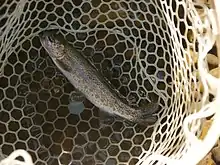Athabasca rainbow trout
The Athabasca rainbow trout is a localized variety of the rainbow trout (Oncorhynchus mykiss), a fish in the family Salmonidae. It is found in the headwaters of the Athabasca river in Alberta Canada.[1] The Athabasca rainbow trout was considered as a form of the Columbia River redband trout (O. mykiss gairdneri) subspecies in the trout handbook of Robert J. Behnke (1992), but considered a separate, yet unnamed subspecies by L. M. Carl of the Ontario Ministry of Resources in work published in 1994.[1] The Athabasca River is a tributary of the Mackenzie River system which flows north into the Arctic Ocean.
| Athabasca rainbow trout | |
|---|---|
 | |
| Scientific classification | |
| Kingdom: | |
| Phylum: | |
| Class: | |
| Order: | |
| Family: | |
| Genus: | |
| Species: | |
| Subspecies: | O. mykiss ssp? |
The Athabasca rainbow trout is one of the few native rainbow trout populations found in an Arctic Ocean watershed. Populations of either coastal rainbow trout (O. m. irideus) or Columbia River redband trout (O. m. gairdneri) exist in Peace and Liard river tributaries in the Mackenzie River system.[2]
The Athabasca rainbow is considered a "May be at risk" species[3] in Alberta due to potential habitat loss and hybridization with introduced rainbow trout".[1]
References
- Rasmussen, Joseph B.; Taylor, Eric B. (2009). "Status of the Athabasca Rainbow Trout Oncorhynchus mykiss in Alberta" (PDF). Government of Alberta-Fish and Wildlife Division. Archived from the original (PDF) on 2014-02-21. Retrieved 2013-11-29.
- Behnke, Robert J. (2002). "Redband Trout of the Columbia River Basin". Trout and Salmon of North America. Tomelleri, Joseph R. (illustrator). The Free Press. pp. 81–86. ISBN 0743222202.
- Rasmussen, Joseph B.; Taylor, Eric B. (2009). "Status of the Athabasca Rainbow Trout Oncoryhnchus mykiss in Alberta" (PDF). Government of Alberta-Fish and Wildlife Division. pp. 26–27. Archived from the original (PDF) on 2014-02-21. Retrieved 2013-11-29.
"May be at risk: Any species that may be at risk of extinction or extirpation, and is therefore a candidate for a detailed risk assessment